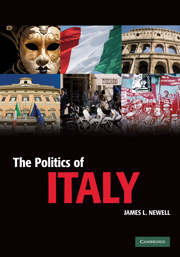Book contents
- Frontmatter
- Contents
- List of figures
- List of maps
- List of tables
- List of boxes
- Acknowledgements
- List of abbreviations
- Chronology
- Map 1 Italian regions and major cities
- Introduction
- I Historical background
- II The polity: structures and institutions of the regime
- III Politics: citizens, elites and interest mediation
- IV Policies and performances
- 8 Economic policy
- 9 Welfare and rights
- 10 Foreign policy
- Appendix: The electoral system for the Chamber of Deputies and the Senate
- References
- Index
8 - Economic policy
Published online by Cambridge University Press: 05 August 2012
- Frontmatter
- Contents
- List of figures
- List of maps
- List of tables
- List of boxes
- Acknowledgements
- List of abbreviations
- Chronology
- Map 1 Italian regions and major cities
- Introduction
- I Historical background
- II The polity: structures and institutions of the regime
- III Politics: citizens, elites and interest mediation
- IV Policies and performances
- 8 Economic policy
- 9 Welfare and rights
- 10 Foreign policy
- Appendix: The electoral system for the Chamber of Deputies and the Senate
- References
- Index
Summary
Introduction
In this and the next three chapters our attention shifts from the structures and processes of government to Italian governments' policy objectives. The nature of such objectives and how successfully they are pursued are important objects of study because of their impact on political behaviour and therefore, ultimately, on political stability. Governments' policy objectives and their success in achieving them are also, of course, of importance to ordinary citizens. Indeed, for most citizens they are essentially the only aspect of politics that really matters to them. Politics is not a central life interest as far as most people are concerned. Thus, they are unlikely to get excited about matters relating to political structures and processes – such as whether or not voting in Parliament should be secret, whether or not the President should be directly elected, as so on. About such policy matters as the crime rate, the cost of living, immigration, drugs and so forth, they do get excited, however.
In this chapter the focus is on economic policy. By this I mean the predispositions of governments with regard to decisions whose purpose is to influence the production of commodities. We begin with economic policy because what governments are able to do in other policy areas is very heavily dependent on their policy in this area. Most other policy decisions require economic resources (taxation or borrowing) in order to fund them.
- Type
- Chapter
- Information
- The Politics of ItalyGovernance in a Normal Country, pp. 253 - 282Publisher: Cambridge University PressPrint publication year: 2010

